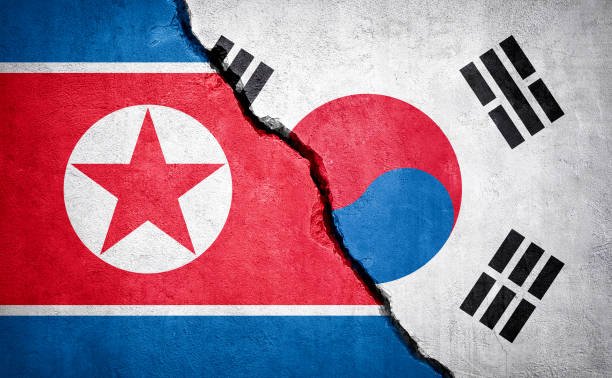Tales of Two Systems - Educations in South Korea and North Korea
By: Daniel Song
Two Koreas
Those who are not familiar with Korean culture, many might think of South Korea and North Korea in similar terms. But in reality, although education in both Koreas strictly focuses on the nation's future, the two countries approach it in dramatically different ways. While South Korea focuses on academic excellence and competitiveness for students, North Korea uses education as a tool for teaching beliefs and social control. This article explores the contrasts between the education systems and disciplinary practices in these two similar but different countries.
While close geographically, North and South Korea share many differences, one of the most prominent being in education | ffikretow from IStock
Education in South Korea
South Korea's education system is known globally for its high academic standards and rigorous discipline. It is said from the ranking article, “Education is highly valued across South Korea”. The education level is different compared to the United States system. Students devour each other inorder to achieve academic excellence. There are also rankings of academics in Korea, unlike the United States. The ranking system leads to more competitive university entrance exams. This competitive culture is deeply embedded in South Korean society, because children are educated as higher ranks and more studies result in success in life in a disciplined mindset. Therefore for South Korea’s education system, involving competitiveness, education is seen as a pathway to social and economic mobility.
In the United States, when children are young, it is generally agreed upon that they learn simple and basic needs. Differently, South Korean students are strictly disciplined from a young age and encouraged to excel academically. Not only is their mindset strictly disciplined, their school days are longer and often exceed evening hours with additional classes known as “hagwons,” or tutors. The students even at their very young age, prepare for college exams known as CSAT. Think about almost every student in Korea competing to be the best. It sounds nearly impossible, but that is how much students need to prepare to exceed the impossible and reach the top. The outcome of the outcome is a university’s admission which is believed to be a student’s future career prospects.
South Korea's education largely revolves around a college entrance exam known as the CSAT | maroke from IStock
Discipline in South Korea
Discipline in South Korean schools has evolved over the years. While corporal punishment was once widespread, it has been banned in modern years. Schools in Korea stopped physical disciplinary measures, instead focusing more on students’ mindsets and attitudes through counseling and management programs. The trend of preventing physical punishment is reflected by the recognition of the students’ mental health and healthier mind set.
However, strict discipline is still in the high expectations for students. Meaning the school rules and respect of authorities are strict, an example can be mandatory uniforms. This structured program is necessary to create a sense of order and discipline, preparing students not only for academic success but also for their future attitude and organized life in the competitive society of South Korea.
Many South Korean school still mandate the usage of uniforms | Kooseul Krystal Kim from Quora
Education in North Korea
As opposed to South Korea, North Korea uses students as a tool and in a way to maintain control over the population. North Korea not only has an education, but also a strict class designed to show loyalty to the ruling Kim family. From an early age, students are educated to respect their leaders.
In North Korean schools, there are special curriculums that the United States does not provide. Those special educations can be political education, military training, and loyalty to the regime. As North Korea's education is more of creating a tool that a dictatorship can use or be respected of, the following steps/foundations are well described according to the fact. Another interesting educational class is history. The history is about Korean history and languages taught with a focus on achievements of the Kim Family. Science and mathematics similarly to normal nations’ educations are available, but the students are often taught with loyalties in central.
North Korean education differs from many other parts of the world, with education emphasizing military training and loyalty to the regime | GERALD BOURKE / WFP VIA GETTY IMAGES
Discipline in North Korea
Similar to South Korea, Koreans possessed a strict discipline system with severe and harsh punishments. But unlike South Korea, North Korea’s discipline system is still ongoing. It is known for its harsh punishments for students. Students are expected to strictly follow the rules and regulations, and any excuses or misdirection can cause a punishment. The key point is for North Koreans to teach obedience, conformity, and loyalty to the state based on the rules. If physical punishment is not used, there are many other ways to be punished, such as public shaming, forced labor, or even detentions.
Conclusion
By contrasting these two similar yet overly different nations, they demonstrate the theme of politics and societal meanings behind the world. South Korea’s not too strict discipline with a focus on academics and competition, whereas North Korea’s emphasis is the perfect obedience and strict discipline for the loyalty of Kim’s family. Despite their differences, both systems have an impact on the students. In South Korea, the restless effort of pursuit of academic success has led to high levels of stress and competition, prompting a suggestion to balance a well healthy schedule. In North Korea, the use of education as a tool for the nation’s control leaves no room for personal freedom or exploration, reflecting the border being a blockade to the lives of North Korean citizens.
Ultimately, education in both countries is not just about knowledge but also about shaping the identities and future jobs of young students who are going to lead the next generation. As such, the contrasts between these two education systems offer a unique window into the different paths that South Korea and North Korea have taken in their approaches to education, discipline, and nation-building.
References:
Kim, Y. South Korean Education System: Challenges and Reforms. N/A ed., vol. X, N/A, 2020. N/A vols. Accessed 28 8 2024.
World Bank Group. Education in the Korean Peninsula: A Comparative Analysis. Washington D.C., World Bank Group, 2021. Accessed 30 8 2024.
Park, S. The Role of Education in North Korean Society. vol. X, 2019. Accessed 29 8 2024.



